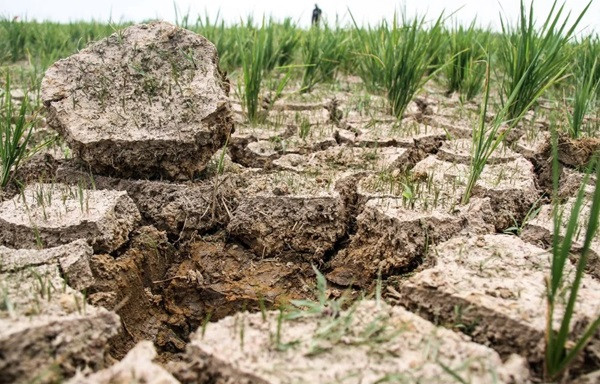Popular Reads
Top Results
Can't find what you're looking for?
View all search resultsPopular Reads
Top Results
Can't find what you're looking for?
View all search resultsGood water governance leads us to global prosperity
Excessive exploitation of water resources may improve prosperity and fair accessibility for some people, but it violates the principle of sustainability.
Change text size
Gift Premium Articles
to Anyone
S
hortly after returning from the 2024 World Bank Land Conference in Washington, DC, I subsequently attended the 10th World Water Forum (WWF) in Bali. From talking about land to talking about water, the two fundamental elements that are inseparable in our life.
As the global population continues to grow rapidly and reach approximately 10 billion by 2050, we will have to deal with land and water scarcity, sooner rather than later. It is indeed one of the most pressing issues facing humanity this century. By 2030, it is estimated that fresh water supplies will fall by 40 percent, but at the same time the world will need up to 60 percent more food than today.
Without land and water, there will be no agriculture; there will be no food. So basically, without sufficient land and water, we are all doomed. These facts alone should be more than enough for us to unite, collaborate and take action.
Now, add global warming and climate crisis to the equation. We cannot afford the price of ignorance and inaction.
Prior to the local and regional authorities’ declaration, I was asked to deliver a speech to the WWF, which was themed “Water for Shared Prosperity”. The theme is relevant and significant, because it embodies at least three inter-related principles, which are meaningful for strengthening our global commitment to establish more effective water governance.
First, water management must always be oriented toward “prosperity", which has a much broader meaning than material wealth. The scope of genuine prosperity also includes the state of success, happiness and health.
This is why for the past 10 years the government has built various water infrastructure facilities all over the country. Most notably, the building of 42 dams, which are aimed at enhancing water supply and irrigation for agriculture, industry and domestic use. They are also utilized for hydro-power generation, flood control and disaster management, as well as for recreation, sport and tourism. All of them generate significant economic value added and growth, which in the end contribute to the prosperity of the people.
Second, “fair accessibility”, which is a manifestation of inter-spatial sharing. Water management must be implemented fairly to provide all citizens with equal access to drinking water and sanitation.
One common issue faced by many countries is regional disparity in access to water resources. Some regions naturally have sufficient, or even abundant water resources. While other regions either lack natural water resources, or lack infrastructure that makes water accessible for their people.
Given this situation, both central and local governments must ensure all individuals and communities have equitable access to safe, affordable and sufficient water resources for their basic needs and livelihoods.
And the third principle is “sustainability”. It is a manifestation of inter-generational sharing. What we do, and what we do not do today, will shape our future. We want our children, and our children’s children to live in a sustainable and livable planet.
Therefore, fresh water must be utilized and preserved properly. It should not be overexploited, even for the sake of economic development and growth.
Mahatma Gandhi reminded us: “the earth, the air, the land and the water are not an inheritance from our forefathers, but on loan from our children. So we have to hand over to them, at least, as they were handed over to us”.
Excessive exploitation of water resources may improve prosperity and fair accessibility for some people. However, it contradicts with the principle of sustainability. On the other hand, prosperity and sustainability may be attained by certain groups through water monopolies or excessive water restrictions. However, they may hinder fair accessibility of water for the wider community.
Therefore, those three principles must be upheld by governments, at all levels, simultaneously, and with a good balance. Because that is the best way to realize the true meaning of shared prosperity.
In order to implement the three principles of prosperity, fair accessibility and sustainability, governments at national level must establish an institution with the authority and the capacity to integrate and synchronize all policies, strategies and actions related to water management. We can learn some of the best practices from countries that have already established such institutions recently, such as Canada in 2023, as well as Saudi Arabia and South Africa earlier this year.
This so-called National Water Agency is aimed at tackling the imminent threats of a water crisis. It should be agile and adaptive, to be able to deal with the extremely broad dimensions of water management, especially in order to prevent and mitigate the crisis. This agency should also be able to resolve the most common bureaucratic problems of ego-sectoral and conflicting interests among stakeholders.
At the same time, by providing effective leadership, this agency will be able to strengthen the cross-sectoral coordination and collaboration effort toward the attainment of Water for Shared Prosperity.
Finally, let us unite, let us collaborate. Through the strong commitment declared by the 10th WWF, global citizens hope that we can come up with an effective solution, and we can take immediate action.
***
The writer is Agrarian Affairs and Spatial Planning Minister and head of National Land Agency.










